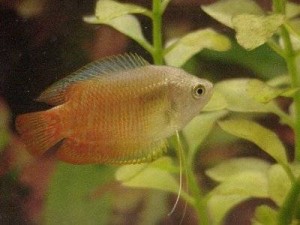





“If I have a very sick fish, which is the most humane way to kill it?”
 Many pond owners are squeamish about killing a fish, even when obviously it is in terrible agony and at death’s door. However, it is a responsibility that must be faced. The safest way to dispatch a sick fish is to hold it firmly in a dry cloth and deliver a sharp blow to its head. Death will be instantaneous. A fish can also be over-anaesthetized by your veterinarian.
Many pond owners are squeamish about killing a fish, even when obviously it is in terrible agony and at death’s door. However, it is a responsibility that must be faced. The safest way to dispatch a sick fish is to hold it firmly in a dry cloth and deliver a sharp blow to its head. Death will be instantaneous. A fish can also be over-anaesthetized by your veterinarian.
“I have a large goldfish that appears to be very swollen and distressed. What could be wrong with it?”
Goldfish with distended bodies can be suffering from several disorders. If the fish is large and female, it could be spawn bound. A female goldfish can normally control whether or not she spawns, depending upon prevailing conditions. Sometimes, the body begins the process of preparing for the breeding season and circumstances change so that the fish begins to re-absorb the eggs that were being developed.
If this is unsuccessful, which can occur if the fish is undernourished or stressed, the eggs become hard and cannot be expelled. They may then begin to decay within the body and an accumulation of gas occurs, which leads to death. Stripping the fish by gently massaging its flanks while holding it in wet hands sometimes helps, but more often than not, the fish dies. Prevention is better than cure; a healthy environment rarely gives rise to such a problem.
Another possible cause of the swelling is dropsy. This is bacterial in origin, and a tell-tale sign of the condition is the accompanying protrusion of the scales on the swollen body. Some fish keepers refer to dropsy as pine cone disease because of the prominence of the scales. Use of a salt bath (25g/1 oz rock salt per 4.5 litres/1 gallon of water), combined with a proprietary antibacterial remedy, may be successful.
If the swelling is on one side of the body only, it could be a tumor. There is no cure, but the fish will probably live for several years.
“My beautiful fantail goldfish is swimming alternately on its back and nose downwards. Every so often, it swims down to the bottom of the pond in a drunken spiral fashion, but soon returns to the top again. What could be causing this apparent loss of balance?”
Unfortunately, this disorder is quite common in fancy goldfish, and is usually associated with a derangement of the swim bladder, which is the balancing mechanism of the fish.
The usual cause of swim bladder disorders is a sudden change of water temperature, which may be caused by a number of different factors, for example stress when fish are introduced into the pool, after a large water change, or during periods of clear frosty weather. Providing the fish with a period of steady water temperature will usually control the problem, although afflicted fish may show similar symptoms if a sudden temperature change occurs.
A similar problem may occasionally occur with fancy goldfish if they are fed an unsuitable diet, and will he apparent for a few hours immediately after feeding. Using a good-quality flake or stick diet should prevent this.
“How can I deter a heron? It visits my small pond regularly, but I am reluctant to cover the pool with a net, as this spoils the plants.”
Herons are not just predators of the countryside; even small ponds in urban gardens are vulnerable to their attentions. While netting will certainly keep them out, it will more often than not detract from the beauty of the pond and can make even the simplest routine pond management difficult.
Providing hiding places for the fish in the pool is a useful idea: perhaps a piece of flat stone supported on a couple of other stones, under which the fish can take refuge. This can usually he arranged without looking unsightly. Otherwise, the only sure way of keeping herons out is to erect a series of short stakes, about 30cm (12in) from the edge of the pond and projecting 15cm (6in) from the ground, and attach a strand of fishing line to them. Herons usually walk into the water to fish and are known to have quite sensitive legs. As the bird walks towards the water, its legs will touch the fishing line, which will tend to deter it from proceeding further.
“When fish die in a pond, do they always come to the surface?”
In the majority of cases they do, so if you have not seen some of your fish for a week or two, it is more likely that they are hiding away among the plants, rather than having died. This is particularly so in spring and autumn. The only occasion when dead fish are unlikely to surface is if they become entangled in submerged plant life. On occasion, this may cause some pollution of the water when they begin to decompose. However, a single fish is unlikely to cause a serious pollution problem, unless it has died from a disease.
Copyright © www.100flowers.win Botanic Garden All Rights Reserved